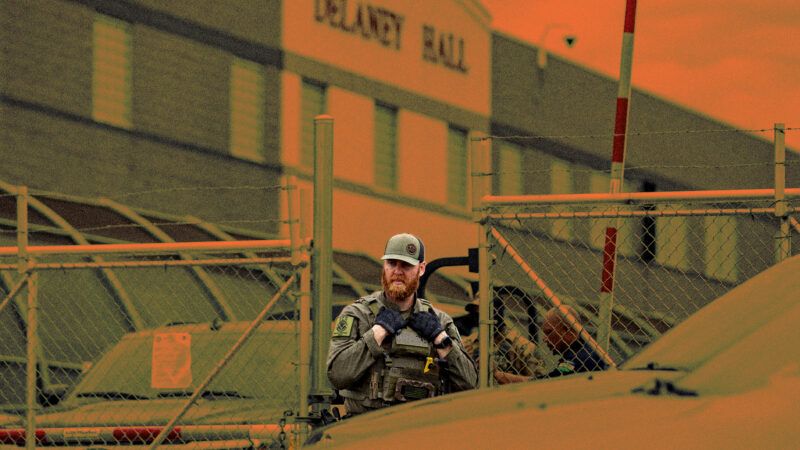Lawmakers Sue ICE To Protect Right To Visit Detention Centers Unannounced
Lawmakers say a new DHS rule requiring advance notice for detention center visits undermines congressional oversight.

On Wednesday, 12 Democratic members of Congress filed a lawsuit in the U.S. District Court for the District of Columbia against the Trump administration for obstructing lawful congressional oversight visits to federal immigration detention centers.
The lawsuit argues that a new rule implemented by the Department of Homeland Security (DHS) and Immigration and Customs Enforcement (ICE), which prohibits visits to ICE field offices and requires at least seven days' notice before touring a facility, blocks members of Congress from ensuring DHS compliance with federal law and properly overseeing how taxpayer dollars are being spent.
Section 527 of the DHS Appropriations Act protects the legal right of members of Congress to visit immigration detention centers, stating, "none of the funds appropriated or otherwise made available to the Department of Homeland Security…may be used to prevent" members of Congress or their staff "from entering, for the purpose of conducting oversight, any facility operated by or for the [DHS] used to detain or otherwise house aliens." According to the act, no prior notice is required for lawmakers, but DHS may require congressional staffers to provide notice at least 24 hours in advance.
The ability to oversee these facilities is particularly important since President Donald Trump took office and began implementing his mass deportation agenda. In the last six months, immigration detentions have reached record highs, leading to reports of overcrowded conditions and increased due process violations.
Following a clash in May at the Delaney Hall detention center in New Jersey, in which Newark Democratic Mayor Ras Baraka was arrested for trespassing while three members of Congress attempted an oversight visit, ICE Director Todd Lyons and DHS Secretary Kristi Noem issued conflicting statements. Lyons recognized that members of Congress have the right to visit facilities unannounced, while Noem dismissed the incident as a "political stunt."
"If these three members had simply asked for a tour," DHS Assistant Secretary Tricia McLaughlin said in a follow-up press release, "these three congressional members would have been easily allowed into Delaney Hall and would not have had to resort to assaulting law enforcement to enter the facility."
But skirmishes between Democratic officials and federal agents continued, as members of Congress were continuously stopped from entering detention facilities without prior notice.
In June, ICE released updated guidance noting that "ICE Field Offices," which are now being used to house detainees as bed space at other facilities fill up, "are not detention facilities and fall outside" Congress' legal purview under section 527. ICE also requested that federal lawmakers provide at least 72 hours' advance notice for oversight visits—48 hours more than congressional staff.
The lawsuit filed on Wednesday to challenge this rule change alleges that representatives were denied entry in July after DHS "adopted a new policy and practice…without any congressional revision to the text of section 527, that purports to require notice 'a minimum of seven (7) days in advance to schedule visits to DHS detention facilities,' absent authorization by the secretary of DHS."
"These members of Congress could have just scheduled a tour; instead, they're running to court to drive clicks and fundraising emails," McLaughlin told the Associated Press in an email regarding the lawsuit challenging the new visitation rules.
Even if the lawsuit is merely a political stunt to "drive clicks and fundraising emails," it is still worthwhile to protect congressional authority to check government power and demand accountability for due process violations. On July 4, Trump signed legislation appropriating $45 billion to expand ICE's detention capacity to at least 116,000 non-citizens, despite ongoing legal challenges regarding the administration's current detention practices. Such a huge amount of funding alone demands oversight, but without proper redress, rights violations will skyrocket right alongside the rapidly expanding immigration industrial complex.
